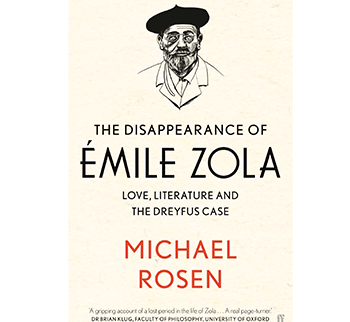One of the watershed moments in modern Jewish history was the Dreyfus Affair.
One need not be a student of Jewish history to know about the false accusations and wrongful conviction of Jewish-French army officer Alfred Dreyfus in 1894. Later, Dreyfus was retried and reconvicted again on entirely fabricated evidence.
Like the Pharos lighthouse at the port of ancient Alexandria guiding ships to a safer shore, the affair cast a sharply illuminating light through heavily clouded social surroundings, enabling many Jews at the time to see their situations more clearly. Theodor Herzl, then a journalist reporting on the trial, was one of those Jews.
Numerous books and countless popular and scholarly articles have been written on the Dreyfus Affair. A recent work, written by English novelist, historian and biographer Piers Paul Read, refers to it in the title of his book as “the most infamous miscarriage of justice in French history.”
READ: CAPTIVATING BOOK IS A QUEST FOR FREEDOM
Many in France regarded the miscarriage of justice as an outrage and were determined to raise their voices in loud, voluble protest. That protest crystallized when one of France’s most renowned writers, Émile Zola, wrote a long, detailed, untempered indictment about the travesty, which was addressed to the president of France. On Jan. 13, 1898, it appeared on the front page of the newspaper L’Aurore, under the eye-catching headline, “J’Accuse.”
True to the hardscrabble, tell-it-like-it-is style of his writing, Zola actually named the officers whom he held responsible for the miscarriage of justice:
“As I have shown, the Dreyfus case was a matter internal to the War Office: an officer of the General Staff, denounced by his co-officers of the General Staff, sentenced under pressure by the chiefs of staff. Once again, he could not be found innocent without the entire General Staff being guilty. And so, by all means imaginable, by press campaigns, by official communications, by influence, the War Office covered up for (Ferdinand Walsin) Esterhazy, to condemn Dreyfus once again.”
For Zola, the wrongful conviction of Dreyfus was a “crime against society” that “sullied” France. He pulled no punches.
“It is a crime to have relied on the most squalid elements of the press and to have entrusted Esterhazy’s defence to the vermin of Paris, who are now gloating over the defeat of justice and plain truth. It is a crime that those people who wish to see a generous France take her place as leader of all the free and just nations are being accused of fomenting turmoil in the country, denounced by the very plotters who are conniving so shamelessly to foist this miscarriage of justice on the entire world. It is a crime to lie to the public, to twist public opinion to insane lengths, in the service of the vilest death-dealing machinations. It is a crime to poison the minds of the meek and the humble, to stoke the passions of reactionism and intolerance by appealing to that odious anti-Semitism that, unchecked, will destroy the freedom-loving France of the Rights of Man. It is a crime to exploit patriotism in the service of hatred, and it is, finally, a crime to ensconce the sword as the modern god, whereas all science is toiling to achieve the coming era of truth and justice,” wrote Zola.
The fault lines in French society that Dreyfus’ trials had exposed, fractured openly with explosive force after the publication of “J’Accuse.” Zola was charged and found guilty of having defamed the highest offices of the country. His life was threatened by large riotous mobs, even as he tried to leave the courthouse.
Acting on the advice of his colleagues and legal advisers, he hastily fled to England, with only the clothes he was wearing at the time. He remained in England, living outside London from July 1898, to June 1899.
Michael Rosen, an accomplished English teacher, poet and broadcaster, has chronicled the life that Zola led during his 11 months of self-imposed exile. The Disappearance of Émile Zola: Love, Literature and the Dreyfus Case tells the reader with meticulous detail – too much detail at times – how the crusading French author endured his nearly year-long absence from the culture, context and country that he so cherished.
Zola’s life was unconventional. He loved the woman legally recognized as his wife. He also loved another woman, who was functionally, if not legally, his wife, as well as the two children she bore him. These five individuals achieved a modus vivendi that enabled Zola to continue with his writing, even during his difficult days in exile.
Rosen writes skillfully and with a swift pace. He excerpts from original correspondence and provides informative context to the various physical locations in which Zola lived during his stay in England.
Even with the constant domestic detailing of Zola’s life, the thematic anchor of the book is the ongoing status of the Dreyfus proceedings. Rosen always provides the reader with updates on the status of legal developments back in Paris, because the status of Zola’s legal appeal of his libel conviction – and thus the length of his exile – was tied to the progress in the Dreyfus proceedings.
Rosen’s work is more than a detailed account of Zola’s 11 months in England. It is also a thoughtful reflection on the nature and the purpose of honest journalism, as enunciated by Zola.
Zola wrote effusively in a manner that attempted to capture the realism of his subject, and he preferred to write expansively about truth, rather than to protect sensibilities by hiding unavoidably harsh details.
“Let all be exposed and discussed, in order that all may be cured,” Zola once answered his translator when asked to rein in some of his realism-obsessed prose.
There is much in this credo for readers of our day to ponder. Under the cover of the thick details of Zola’s life in England, Rosen includes various nuggets of history, politics and literature for the reader’s information and consideration.
